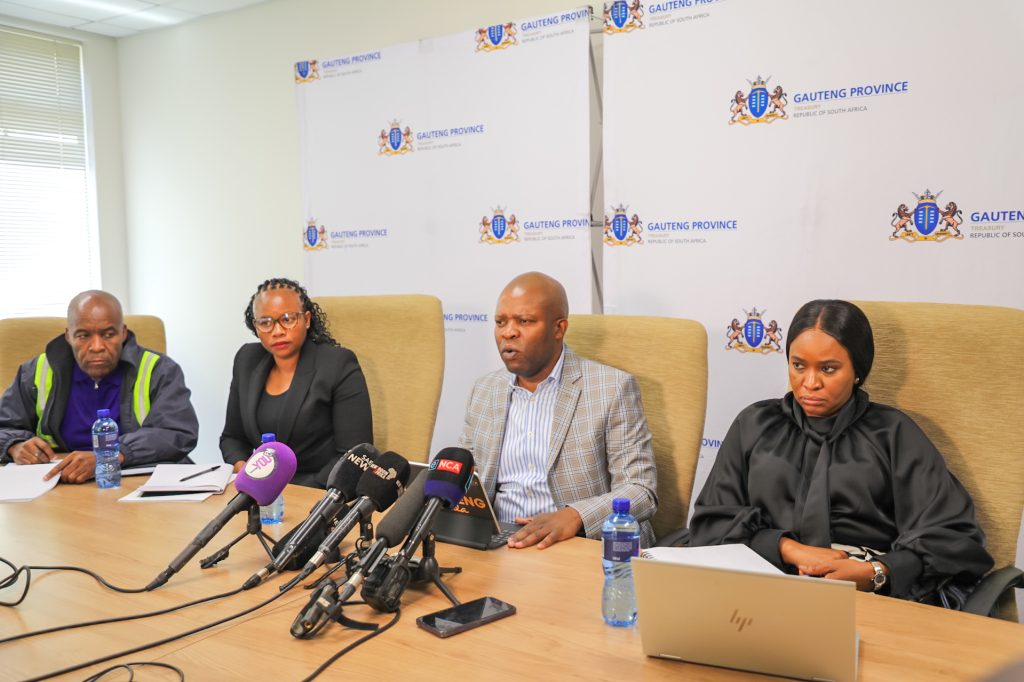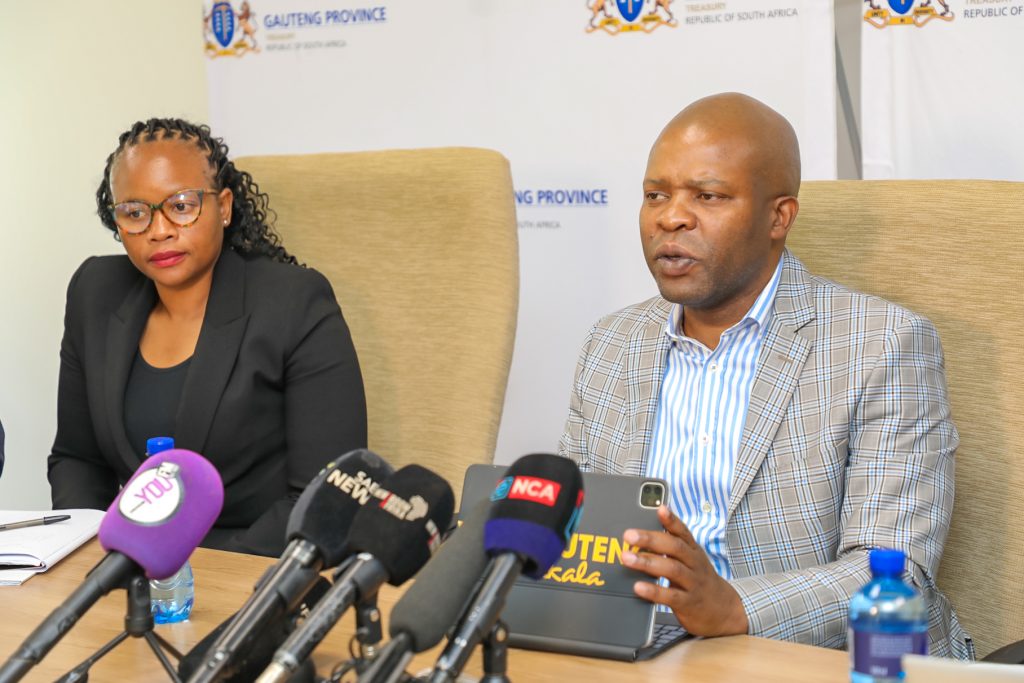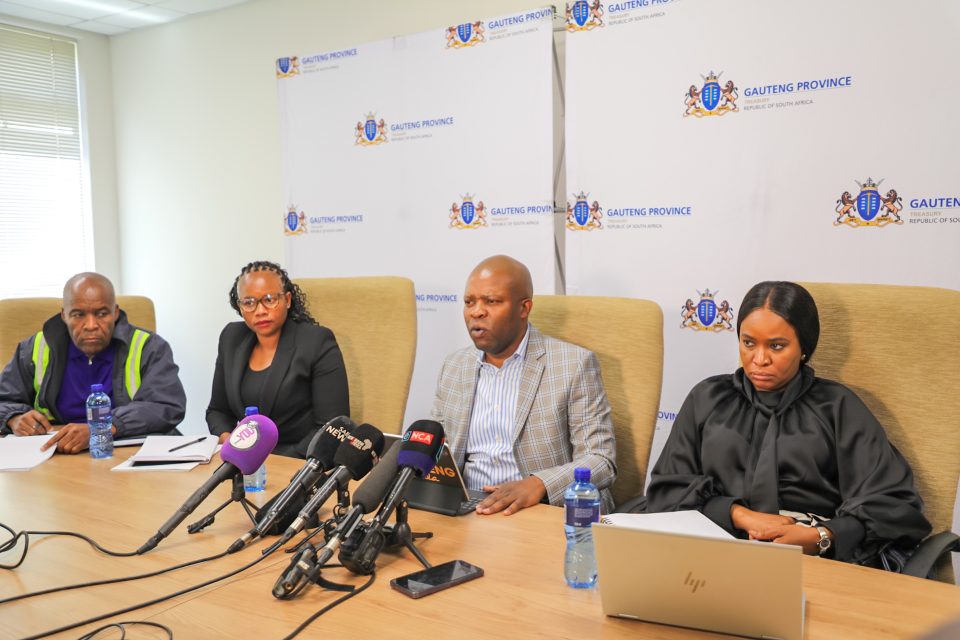
On the 29th of October 2024, the Gauteng MEC of Finance and Economic Development, Lebogang Maile, and a delegation comprising of senior officials in the Gauteng Provincial Treasury, met with the Executive Mayor of the City of Tshwane, Dr. Nasiphi Moya, and her delegation, to deliberate on the state of finances and governance in the administrative capital. In addition to this, MEC Maile sought to understand how transitional matters would impact on the budget and finances of the metropolitan municipality, as well as make a comprehensive assessment of the role that the GPT should play in stabilising the finances of the City as a means of improving its audit outcomes and financial governance.

Government of Local Unity and budget
The recently reconstituted government of the City of Tshwane, now a Government of Local Unity (GLU) led by Dr. Moya, must grapple with the classic dichotomy of change and continuity in the context of the municipality. Ensuring the delivery of services will necessitate a change in the programme of action, while continuity must be prioritised to ensure stability. The Council’s programme of action must give assurance to the people of Tshwane that service delivery is the primary agenda of the GLU.
The issue of the unfunded budget of the municipality remains a primary concern. The GPT and the City of Tshwane deliberated on some of the key fiscal measures that the City will adopt to address this. The GPT emphasised the need to be stringent in terms of cost savings measures and demonstrating fiscal prudency. A key measure herein is the reduction of programs that are not implementation ready. In addition to this, the GPT has received assurance from Executive Mayor Dr. Moya that as part of ensuring that historically disadvantaged communities are equitably empowered, the administration will make some changes to the adopted 2024/2025 budget, in consultation with communities. These changes will be taken up during the budget adjustment period and will adhere to fiscal prudency and strategic prioritisation.
Total outstanding creditors and debtors
The City of Tshwane’s debtor’s book is R24.340 billion as at 30 September 2024, increasing from R22.700 billion as per pre-audited figures for the 2024/24 financial year. The bulk of the debtors are households at R17,7 billion or 72.8 percent, followed by commercial businesses at R5,8 billion or 23.9 percent. This indicates that the implementation of credit control policy is not effective. This has a negative impact on the liquidity of the municipality. The City of Tshwane outstanding creditors as at 30 September 2024 were R11.195 billion, increasing from R6.718 billion as per the pre-audited financial report. Bulk electricity has increased by almost a R1 billion, whilst bulk water has reduced significantly. Trade creditors increased by almost R4 billion, which is mainly the current account due by end of October 2024. Non-compliance with Section 65.2(e) remains a serious cause for concern.
As per the Section 41 Report from the National Treasury relating to Rand Water, the City of Tshwane owes R517.014 million as at 30 September 2024. This is a reduction from R538.057 million as per the pre-audited financial reports for the 2023/24 financial year. It is commendable that the City has honoured its arrangement with the bulk water utility through an extended relief arrangement to pay the current account in 45 days. However, as per the Section 41 Report relating to Eskom, the City of Tshwane owes R7.885 billion as at 30 September 2024, increasing from R7.500 billion as per the pre-audited financial reports for the 2023/24 financial year. This balance does not match the financial data the municipality reports through its financial system. The GPT will, moving forward, sensitise the municipality on when they have outstanding balances with Eskom and where necessary, mitigate disputes between the two parties while also working to facilitate a payment agreement that does not imperil either party.
Job security and the filling of vacancies
The City of Tshwane has demonstrated commitment to prioritising job security for its employees. The recently Council-approved five-year salary increment agreement for workers in the municipality will remain in place as the Executive Mayor and senior officials note that it will go a long way in cushioning workers’ financial difficulties. The five-year salary agreement was concluded on the 6th of September 2024, under the auspices of the South African Local Government Bargaining Council (SALGBC). The City has also reiterated its commitment to upholding the approved resolution to implement the City’s collective agreement with workers’ unions. The GPT recognises that job certainty is a critical component of stable governance as it gives assurance of continuity in the midst of change. Furthermore, the City has prioritised the filling of critical vacant posts to address service delivery challenges that it is confronted with.
Capex management and implementation of infrastructure programmes
While spending on internally generated funds is progressing very well at an average of 32 percent, the City of Tshwane average capital spending is 14 percent as of 30 September 2024. This level of spending is considered poor and concerning considering that the first quarter of the 2024/25 financial year has lapsed. Furthermore, the lack of spending on the Urban Settlements Development Grant (USDG) is cause for concern. The USDG is a substantial conditional capital allocation to metropolitan municipalities and the only supplementary grant at local government level. The City’s low spending on the USDG and the Programme and Project Preparation Support Grant (PPPSG), including the negligible spending on the
Neighbourhood Development Partnership Programme Grant (NDPG) at the end of the first quarter, significantly enhance the likelihood that some funds may be forfeited during the stopping and reallocation of funds process. Through our various intergovernmental structures, the GPT will continue to monitor the situation and provide technical advice to the municipality.
Audit outcomes and GPT support
The GLU has the difficult task of stabilising a municipality that has, over the past few years, been under significant financial strain. This is evidenced in the audit outcomes of the City, with the audit opinion for the 2021/2022 financial year having been adverse and the audit outcome of the subsequent financial year, 2022/2023, having been qualified. Of significance to note is that in the 2021/2022 financial year, the audit opinion was based on adverse findings in three areas in particular, namely cashflow, trade payables and assets. Significant improvements were made to resolve some of these challenges, and while the subsequent qualified audit outcome of the 2022/2023 financial year is still negative, it does represent an improvement in governance. This is the result of measures being put into place to stabilise the municipality’s finance and governance.
As part of providing support to municipalities, the GPT has embarked on operational plan support and monitoring activities. These include activities to improve the financial reporting control environment. On a quarterly basis, the team responsible assesses whether municipalities comply with the Municipal Finance Management Act (MFMA). These assessment reports identify opportunities for improvement within the financial reporting control environment. The GPT assess if municipalities are performing their key controls testing, while also assessing whether municipalities are implementing action plans developed in response to the outcomes of the previous year’s audit process. These plans are a requirement in terms of section 131 of the MFMA. On a quarterly basis, the team also assesses the functionality of governance structures, internal audit activities and audit committees. The functionality of governance structures supports municipalities in achieving their own targets through systematic processes that identify and manage risks associated with the municipality’s objectives. Beyond the standard support given to municipalities, the GPT has also introduced new initiatives to improve the credibility of the annual financial statements (AFS). We have introduced the AFS Accelerator Program which requires municipalities to produce interim financial statements.
Another initiative explored was the introduction of the audit preparation workshop where the roles of municipal managers, chief financial officers, audit committee chairpersons and chief audit executives were highlighted for the current audit process. The workshop was organised in conjunction with the Office of the Auditor-General of South Africa, provincial COGTA and the South African Local Government Association (SALGA). The idea is to create a culture shift where annual financial statement preparation is viewed as a year-long process informed by daily, weekly, and monthly disciplines. We believe that through these interventions, the City of Tshwane will be able to improve its financial position and obtain a positive audit outcome.
The Gauteng Provincial Government has prioritised municipal payments to ensure that they contribute to the financial stability and sustainability of the City of Tshwane. This consistent financial support underscores the importance of municipal payments in maintaining the City’s economic health. Engagements between the GPT and the City of Tshwane will remain continuous as we provide the necessary technical support to aid the municipality in its service delivery efforts. We will endeavour to communicate with the public to ensure accountability and transparency.
INFO SUPPLIED.


